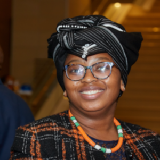Thandokazi Maceba is a Data Curation Officer at the Libraries of the University of Cape Town (UCT). She recently attended The FIAT/IFTA World Conference 2022 in Cape Town, with support from the DPC Career Development Fund, which is funded by DPC Supporters.
I discovered the FIAT/IFTA World Conference 2022 at a time in my career when I was searching for ways to improve my skills set and broaden my scope in the Library and Information Sciences sector. I like the fact that it was happening in Cape Town, and I could learn international industry best practices, and create local and international networks in the comfort of my city.
I am a Data Curation Officer in the Digital Library Services department of the Libraries at the University of Cape Town. As part of my role, I strive to enhance preservation and access processes and workflows for the preservation and access of the libraries and other collections across campus. This is accomplished by utilising the appropriate software, scripts, or tools for data transformation and manipulation and by logically organising a range of file formats for access and preservation.
The FIAT/IFTA World Conference 2022 was themed “Archives out of the box!” The theme touches on the emancipation of the archivist, who has emerged as a key player in media organisations' decision-making processes or, in the case of audio-visual archives outside of broadcasting, a valued curator of online content across a variety of platforms.
I attended the conference with the intention of better understanding how other organisations use curation and preservation workflows and how they may help with problems facing all forms of media curation. It provided me with the skills I need to solve some of the technical problems I have encountered thus far, and to build efficient processes.
Here are a few highlights from a lightning talk in the schedule that was jam-packed. In “Archiving in the cloud: Hybrid Cloud Archive”, Billy Segal Gezelius went into more detail about the general direction of travel, pointed out some of the potential, risks, and issues that a hybrid cloud archive presents, and gave some information. Billy explored how the BBC has combined its product and software engineering expertise with the BBC's physical archives to create BBC Archives Technology & Services, which supports the convergence between broadcast and on-demand paradigms. She shared that by developing a software defined object store that operates natively in the cloud and supplements more conventional Media Asset Management Systems, the BBC wants to better serve its audiences and provide licence fee payers with better value. Beginning in the summer of 2022, the whole of the BBC's digital archive collection will be transferred to the cloud, and certain on-premises legacy technology will be removed.
Furthermore, Billy went on to explain how the cloudification of Acervo Globo is a financially viable project even with the large expenditure required to make the switch to the cloud because the BBC no longer need to purchase LTO media and rely on the prices of an external provider who previously kept our security backup.
Additionally, the project flow is set up to activate the BBC’s first instance backup (saved on Acervo media) if some content on the main instance cannot be accessed. Only in the event of an issue with the first instance backup is the identical content restored from the cloud. They lower the high cost of accessing data from the cloud by reserving it for disaster recovery exclusively. Utilizing cloud-based technology resources like artificial intelligence and machine learning could result in additional project benefits. For instance, teaching robots to recognize Globo stills would enable automatic character tagging of our items, increasing the information and improving the quality of their content without taxing staff. The cloud and all its resources are a part of the world that is currently emerging for Acervo Globo, revealing all its potential as well as its limitations.
The friendly atmosphere of the FIAT/IFTA World Conference encouraged communication and meeting other people in the field of curation was crucial to easing my move to curation and preservation operations. I've discovered that attending events like these in person is the only way to create professional networks that one can call upon during the development and implementation of curation and preservation workflows. With that in mind, if feasible, I am really excited to attend the following edition in 2023!










































































































































